 In 1942,
we joined Otto in Brody: 17,000 citizens, 14,000 of which were Jews.
In 1942,
we joined Otto in Brody: 17,000 citizens, 14,000 of which were Jews. My husband in his duty had 16 forestries under his supervision. He employed about 1,000 Jews as craftsmen and workers. When the terrible time of the Holocaust started, my husband made sure that his people were left aside from the harassment. He created a separate meat store and food store; in those stores only Jews could shop because they could not get food anywhere else. The groceries and meat, Otto got from the places he governed.
My husband said, "Whoever works for me needs to be treated honestly, no matter if Jew, Pole, or German."
Otto tried to protect their apartments by putting up signs that said: "This house is under the protection of the Forest Master Hassenstein."
The German government was very suspicious of Otto and the other officers stationed in Brody, and other German families stopped socializing with us.
The harassment of the Jews took worse and worse shape. Every four weeks there were Aktions. It was unbelievable, and . . . I was ashamed to be German. I started to hide Jews in our house. Word got around, and more and more people came around; and I didn't turn any away. In our large attic, I hid mothers and children and brought them food myself, by climbing up a ladder.
When the Aktions were over, everyone could go home. But then the Jewish law got more severe and they instated a death penalty for anyone who housed Jews or gave them a piece of bread. I was warned by the Poles, but I had to help. When the ghetto was created and fenced in, the big suffering started. Still, some of them made it through to me.
One day, it was made law that every Jew on the street would be vogelfrei [meaning that they were "free like birds"--in other words, were not citizens of any place, had no rights, and could be beaten or killed legally. S.H.].
I still had a mother and son with me, and I could not send them away because it would have been sending them to death. This woman [Lisa Hecht] had jumped off a moving train twice that was on its way to gas chambers.* She stayed with me for weeks, until one day we were betrayed and the police came in to my home and found her.
My husband was taken out of his government services as punishment, and I was put in front of special tribunal in Lemberg [now Lviv] on Oct 1, 1943; and I got a death sentence for hiding and helping a Jew. I was in prison in Lemberg for 3½ months, until January or February, 1944, and then my sentence was downgraded by Otto's finagling to two years in prison . . . but they released me temporarily because of injury.** After gaining my health, I was supposed to be moved Ravensbrüch to serve the two years.
While recovering, I was supposed to report to Neuruppin, a town that was 30 kilometres from our forestry. In 1945, the Russians came and so the sentence was not carried out.
